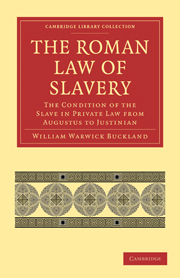Book contents
- Frontmatter
- PREFACE
- Contents
- ERRATA, ADDENDA, AND LIST OF ABBREVIATIONS
- LIST OF PRINCIPAL ABBREVIATIONS
- PART I CONDITION OF THE SLAVE
- CHAPTER I Definition and General Character
- CHAPTER II The Slave as Res
- CHAPTER III The Slave as Res (cont.). Sale of Slaves
- CHAPTER IV The Slave as Man. Non-Commercial Relations
- CHAPTER V The Slave as Man (cont.). Non-Commercial Relations (cont.). Delicts by Slaves
- CHAPTER VI The Slave as Man (cont.) Commercial Relations apart from Peculium. Acquisitions
- CHAPTER VII The Slave as Man (cont.). Commercial Relations apart from Peculium. Liabilities
- CHAPTER VIII The Slave as Man (cont.). Commercial Relations. Peculium. Acquisitions, Alienations, etc
- CHAPTER IX The Slave as Man (cont.). Commercial Relations. Peculium (cont.). Liabilities
- CHAPTER X Special Cases
- CHAPTER XI Special Cases (cont.)
- CHAPTER XII Special Cases (cont.)
- CHAPTER XIII Special Cases (cont.)
- CHAPTER XIV Special Cases (cont.)
- CHAPTER XV Special Cases (cont.)
- CHAPTER XVI Special Cases (cont.)
- PART II ENSLAVEMENT AND RELEASE FROM SLAVERY
- APPENDIX I The relation of the contractual actions adiectitiae qualitatis to the Theory of Representation
- APPENDIX II Formulation and Litis Consumptio in the actions adiectitiae qualitatis
- APPENDIX III Form used by Slave in acquisition by Mancipatio, etc.
- APPENDIX IV The essential character of Manumission: Iteratio
- APPENDIX V Manumission vindicta by a, filiusfamilias
- INDEX
CHAPTER IV - The Slave as Man. Non-Commercial Relations
Published online by Cambridge University Press: 07 September 2010
- Frontmatter
- PREFACE
- Contents
- ERRATA, ADDENDA, AND LIST OF ABBREVIATIONS
- LIST OF PRINCIPAL ABBREVIATIONS
- PART I CONDITION OF THE SLAVE
- CHAPTER I Definition and General Character
- CHAPTER II The Slave as Res
- CHAPTER III The Slave as Res (cont.). Sale of Slaves
- CHAPTER IV The Slave as Man. Non-Commercial Relations
- CHAPTER V The Slave as Man (cont.). Non-Commercial Relations (cont.). Delicts by Slaves
- CHAPTER VI The Slave as Man (cont.) Commercial Relations apart from Peculium. Acquisitions
- CHAPTER VII The Slave as Man (cont.). Commercial Relations apart from Peculium. Liabilities
- CHAPTER VIII The Slave as Man (cont.). Commercial Relations. Peculium. Acquisitions, Alienations, etc
- CHAPTER IX The Slave as Man (cont.). Commercial Relations. Peculium (cont.). Liabilities
- CHAPTER X Special Cases
- CHAPTER XI Special Cases (cont.)
- CHAPTER XII Special Cases (cont.)
- CHAPTER XIII Special Cases (cont.)
- CHAPTER XIV Special Cases (cont.)
- CHAPTER XV Special Cases (cont.)
- CHAPTER XVI Special Cases (cont.)
- PART II ENSLAVEMENT AND RELEASE FROM SLAVERY
- APPENDIX I The relation of the contractual actions adiectitiae qualitatis to the Theory of Representation
- APPENDIX II Formulation and Litis Consumptio in the actions adiectitiae qualitatis
- APPENDIX III Form used by Slave in acquisition by Mancipatio, etc.
- APPENDIX IV The essential character of Manumission: Iteratio
- APPENDIX V Manumission vindicta by a, filiusfamilias
- INDEX
Summary
In political life, it need hardly be said, the slave had no share. He could hold no office: he could sit in no public assembly. He might not serve in the legions: it was indeed a capital offence for him to enrol himself. Such service was the duty and privilege of citizens, and though, in times of pressure, both during the Republic and late in the Empire, slaves were occasionally enrolled, the exceptional nature of the step was always indicated, and the slaves so enrolled were rewarded with liberty, if indeed they were not usually freed with a view to their enrolment. In like manner they were excluded from the decurionate in any town, and it was criminal in a slave to aspire in any way to the position. But though they never occupied the highest positions in the public service, they were largely employed in clerical and manual work in different departments, and even in work of a higher kind.
Both at civil and praetorian law, slaves pro nullis habentur. This is not so at natural law, quia quod ad ius naturale attinet omnes homines aequales sunt. We have already noted some results of this conception, and have now to consider some others.
The decay of the ancient Roman religion under the emperors makes it unnecessary to say more than a few words as to the position of the slave in relation thereto. The exclusion of slaves from many cults is not due to any denial of their claim to divine protection, but to the circumstance that the divinities, the worship of whom was most prominent, had special groups under their protection to which slaves did not belong.
- Type
- Chapter
- Information
- The Roman Law of SlaveryThe Condition of the Slave in Private Law from Augustus to Justinian, pp. 73 - 97Publisher: Cambridge University PressPrint publication year: 2010First published in: 1908



